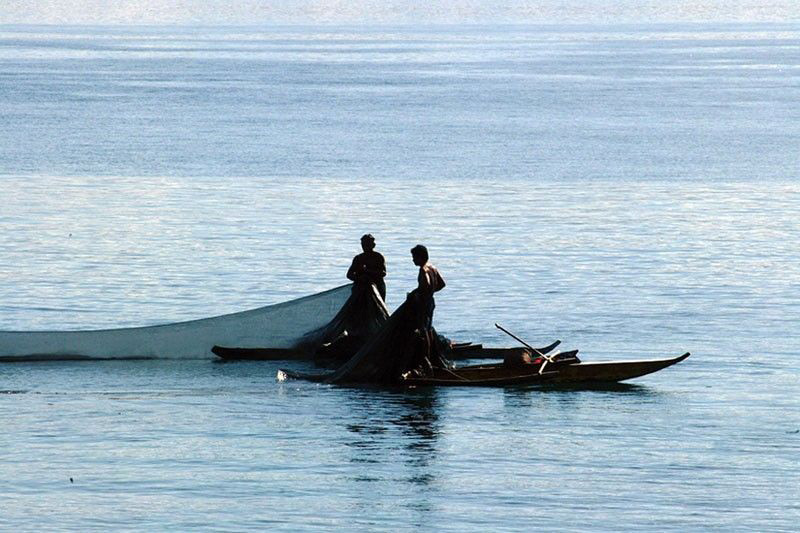Probe of cyanide fishing at Scarborough Shoal sought

By John Victor D. Ordoñez, Reporter
A PHILIPPINE senator has filed a resolution seeking to investigate the damage caused by cyanide fishing at Scarborough Shoal in the South China Sea, allegedly by Chinese and Vietnamese fishermen.
The Senate should look at the incident because it undermines the Philippines’ marine ecosystem and territorial integrity, Senator Francis N. Tolentino said in Resolution 938, citing reports that the damage had reached P1 billion.
“The Philippines, as a party to the Convention of Biological Diversity signed in 1992, is obligated to guard against the unsustainable use of coastal and marine resources which includes the country’s commitment to addressing the threat of cyanide use and its impact on coastal biodiversity,” he said.
The convention has been ratified by 196 countries.
China’s Foreign Ministry spokesperson Mao Ning earlier said the allegations of cyanide fishing were “baseless and a sheer fabrication.”
“The use of cyanide or other noxious or poisonous substances is a clear case of illegal, unreported and unregulated fishing,” Mr. Tolentino said, adding that it undermines the sustainability of the global marine ecosystem.
The Bureau of Fisheries and Aquatic Resources (BFAR) on Feb. 17 said Chinese and Vietnamese fishermen had been using cyanide at Scarborough Shoal, locally called Bajo de Masinloc, to prevent Filipino fishing boats from fishing in the area.
President Ferdinand R. Marcos, Jr. has ordered the Philippine Coast Guard (PCG) and BFAR to conduct joint scientific research to find out if Chinese fishermen were behind the cyanide use. The agencies will work with the University of the Philippines Marine Science Institute.
The shoal is 240 kilometers west of the main Philippine island of Luzon and is about 900 kilometers from Hainan, the nearest major Chinese landmass.
Located within the Philippines’ exclusive economic zone (EEZ), Scarborough Shoal is also claimed by China, making it one of Asia’s most contested maritime features and a flashpoint for flare-ups.
China claims almost the entire South China Sea, a conduit for more than $3 trillion in annual ship commerce. Its territorial claims overlap with those of the Philippines, Vietnam, Malaysia and Brunei.
Mr. Marcos had ordered stricter patrols at the shoal.
Based on a study by the Center for Strategic and International Studies in December, China’s dredging and giant clam harvesting have damaged at least 21,000 acres of coral reefs in the South China Sea.
Vietnam has also been building outposts in the area, damaging at least 1,500 acres of coral reefs through dredging. The Philippines, Malaysia and Taiwan have damaged fewer than 100 acres of coral reefs, according to the study.
At the weekend, the Chinese Embassy in Manila questioned the results of the study since it had only relied on satellite images.
“China has always attached great importance to the protection of the ecological environment of the Nansha Islands (Spratly Islands) and reefs and their adjacent waters, and carried out environmental protection and monitoring work in accordance with domestic and international laws,” it said in a statement on Feb. 24.
Meanwhile, the Philippine Senate approved on third and final reading a bill that seeks to set up maritime zones and territories in the South China Sea.
Twenty-three senators unanimously approved Senate Bill 2492, which will also set up maritime zones in the Benham Rise in the West Pacific.
The bill “upholds the principles of sovereignty, environmental sustainability and maritime security,” Senator Francis N. Tolentino, who sponsored the measure, told the plenary.
He said the proposed law would safeguard Philippine maritime interests “for generations to come.”
Under the bill, Philippine authorities may impose a fine of as much as $1 million (P56 million) on foreign actors that build artificial islands, conduct marine research and destroy Philippine marine environments within the maritime zones.
The Senate special committee on maritime and admiralty zones is also looking into measures seeking to establish archipelagic sea lanes to safeguard the country’s marine resources.
“This law and all our efforts to protect our territorial integrity are among the greatest legacies we can leave for future generations of Filipinos,” Senate Majority Leader Emmanuel Joel J. Villanueva told the Senate floor.
Gregory B. Poling, a senior fellow and director of the Southeast Asia Program and Asia Maritime Transparency Initiative at the Center for Strategic and International Studies, has said the measure would build up the Philippines’ “moral and legal high ground” in staking its claim on the waterway.
The National Mapping and Resource Information Authority last year said it would finish mapping Philippine territories in the South China Sea by 2028.



